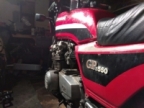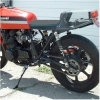Jet compatibility question
- blackumi
-
 Topic Author
Topic Author
- Offline
- User
-

Registered
- Posts: 48
- Thanks: 4
Jet compatibility question
05 Oct 2017 10:34 - 05 Oct 2017 10:36
So this isn't your "what jet should I run" thread, I know better than that :laugh:
The previous owner of my bike installed some Mikuni #105 main jets in my TK22 carbs, and I'm running a bit rich at WOT.
I would much like to use the proper TK jet, but are the sizes the same or similar?? For instance, if I install a #100 TK jet, will that still be considered leaner??
The previous owner of my bike installed some Mikuni #105 main jets in my TK22 carbs, and I'm running a bit rich at WOT.
I would much like to use the proper TK jet, but are the sizes the same or similar?? For instance, if I install a #100 TK jet, will that still be considered leaner??
1983 GPZ 550
1986 Toyota Corolla AE86
1986 Toyota Corolla AE86
Last edit: 05 Oct 2017 10:36 by blackumi.
Please Log in or Create an account to join the conversation.
- loudhvx
-

- Offline
- KZr Legend
-

Registered
- Posts: 10864
- Thanks: 1619
Re: Jet compatibility question
05 Oct 2017 11:52 - 05 Oct 2017 11:58
Apples to oranges makes the direct comparisons difficult. But it will be somewhere in the vicinity.
Tk jets are numbered to describe the diameter of the orifice in hundredths of millimeters.
Dynojet jets are numbered the same way, as are some of the compatible Keihin jets I've measured.
Other Keihin and Mikuni jets may not follow the same rule for numbering.
Another issue is the internal shape of the jet, and the length of the orifice inside the jet. A longer orifice acts more restrictive. Also the depth of the orifice in the fuel will affect not only the flow, but the dynamic characteristic of the jet.
So there are several variables in play.
Here is a link to three types of mains I've used:
s3.amazonaws.com/gpzweb/TK22mainPage/TK2...22jetsAndDrills.html
Notice the different placement and length of orifice, especially between the Keihin and the Tk mains.
The Dynojet main is fairly consistent with the Tk, so Dynojet mains will only be different by a number or two to get the equivalent jet.
I was not aware there was a Mikuni main jet of the same thread. Are you sure he didn't mess up the threads to force a Mikuni main into the jet holder?
Bottom line is it will be close, but when switching to a different jet type, you will need a small assortment near the number in question.
For the Tk22 running pods on a gpz motor with a 4-into-1 exhaust, I would start somewhere in the 96 to 100 range.
Needle position through careful shimming will greatly effect what jet to use.
Also, make sure your WOT position is not beyond 100% open. That will make for an overly rich condition at WOT, which is usually how they come from the factory. Here's a link on how to check it:
s3.amazonaws.com/gpzweb/TK22mainPage/TK2...stmentsAndMaint.html
Tk jets are numbered to describe the diameter of the orifice in hundredths of millimeters.
Dynojet jets are numbered the same way, as are some of the compatible Keihin jets I've measured.
Other Keihin and Mikuni jets may not follow the same rule for numbering.
Another issue is the internal shape of the jet, and the length of the orifice inside the jet. A longer orifice acts more restrictive. Also the depth of the orifice in the fuel will affect not only the flow, but the dynamic characteristic of the jet.
So there are several variables in play.
Here is a link to three types of mains I've used:
s3.amazonaws.com/gpzweb/TK22mainPage/TK2...22jetsAndDrills.html
Notice the different placement and length of orifice, especially between the Keihin and the Tk mains.
The Dynojet main is fairly consistent with the Tk, so Dynojet mains will only be different by a number or two to get the equivalent jet.
I was not aware there was a Mikuni main jet of the same thread. Are you sure he didn't mess up the threads to force a Mikuni main into the jet holder?
Bottom line is it will be close, but when switching to a different jet type, you will need a small assortment near the number in question.
For the Tk22 running pods on a gpz motor with a 4-into-1 exhaust, I would start somewhere in the 96 to 100 range.
Needle position through careful shimming will greatly effect what jet to use.
Also, make sure your WOT position is not beyond 100% open. That will make for an overly rich condition at WOT, which is usually how they come from the factory. Here's a link on how to check it:
s3.amazonaws.com/gpzweb/TK22mainPage/TK2...stmentsAndMaint.html
1981 KZ550 D1 gpz.
Kz550 valve train warning.
Other links.
Kz550 valve train warning.
Other links.
Last edit: 05 Oct 2017 11:58 by loudhvx.
The following user(s) said Thank You: blackumi
Please Log in or Create an account to join the conversation.
Moderators: Street Fighter LTD
